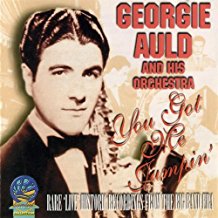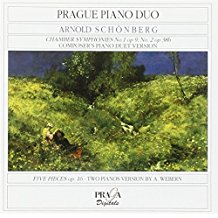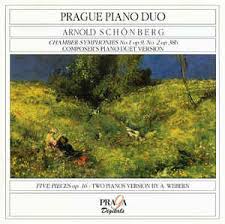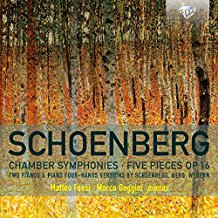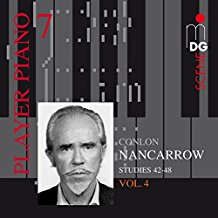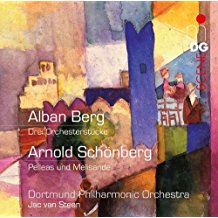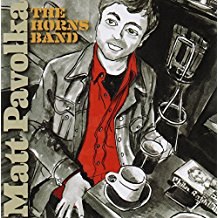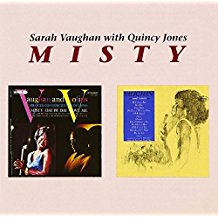-
Posts
13,205 -
Joined
-
Last visited
-
Donations
0.00 USD
Content Type
Profiles
Forums
Events
Blogs
Everything posted by Larry Kart
-
Likewise, I was surprised that on a recent list here of latter-day Ellington recordings, many of which were singled out as being of special merit, this one was not. It's superb:
-
https://www.amazon.com/You-Got-Jumpin-GEORGIE-AULD/dp/B0009JOQ02/ref=sr_1_1?ie=UTF8&qid=1519514497&sr=8-1&keywords=georgie+auld+you+got Interesting boppish ten-piece band, recorded live and in decent or better sound. Personnel: Auld, Pete Terry, t. sax. Clint Neagley, alto, Gerry Mulligan, b. sax, Neal Hefti, tpt., Billy Byers, trb., Jimmy Rowles, piano, Joe Mondragon, bs. Alvin Stoller, drms. Karl Kiffe, bongos. Hefti and Byers get a good deal of solo space -- both as good as I've ever heard them. Auld, of course, was a swinger. I've wondered about this passage from Tom Nolan's book on Artie Shaw: In Tom Nolan's Three Chords for Beauty's Sake, his biography of Artie Shaw, Nolan quotes Shaw on Auld:"At Buddy [Rich's] funeral [in 1987], I'm talking to Mel Brooks, outside the funeral home. And Georgie Auld—he turned out to be a fucking gangster, horrible guy—he comes up: 'You're fulla shit. You're fulla shit.' 'Wadya mean, George? Wadya talkin' about?' I said, 'Is that your considered opinion? Is there anything you want to add to that?' "George was disappointed he wasn't called on to speak [at Buddy's funeral] and was very angry. 'You're fulla shit.' That's all he could say! Chagrin! What—I dunno, he identified himself with me, and he never could quite make it, as a star, you know, whatever it was. Angered him. Infuriated him. When I quit the music, man [in 1939], I gave him the band; I gave him my book. He could not make it work. He didn't have the quality that it took. Certain people don't." Auld was a "horrible guy," who "turned out to be a fucking gangster"? Hmm. Well, Shaw for sure was a narcissistic asshole in the top class, in addition to being a great clarinetist. So who knows what's up here, if anything. Also, of course Auld couldn't make it work as the leader of Shaw's 1939 band after Shaw quit; no one could have. People wanted to see/hear Artie, not his band, fine as it still was.
-
This is all I have, repeats the above: SELDON POWELL SEXTET NYC. 1956 Eight titles:Jimmy Cleveland (tb), Seldon Powell (ts), Roland Hanna (p), Freddie Green (g), Aaron Bell (b), Osie Johnson (dm).) NYC. 1956 Four titles: As above except Gus Johnson (dm) replaces Osie Johnson. Bought this on LP back then. Very good stuff. A later nice taste of Powell: https://www.youtube.com/watch?v=sDYRJZT3WMg Early 60's hard bop session lead by drummer Bill English, with Dave Burns, Seldon Powell, Martin Rivera and Lloyd Mayers. 222 Fly Me To The Moon Rollin' Heavy Soul 7th Ave Bill A Blues Serenade Sel's Tune Makin' Whoopee
-

Jazz albums w/ backup chorus or small vocal choir...
Larry Kart replied to Rooster_Ties's topic in Miscellaneous Music
How many albums did the SU do with Farnon? I have two -- "Sentimental Journey" and "Eventide." -

What Classical Music Are You Listening To?
Larry Kart replied to StarThrower's topic in Classical Discussion
I now have listened to Berg's arrangement of AS' Op. 9 from the second disc mentioned above, which arrived the other day. Fascinating its own right, it could hardly be more different than AS' own four-hands arrangement. In AS' arrangement for the most part there is a clear differentiation between treble and bass information/figures (or right hand versus left hand figures if one were talking about a single pianist rather than, as is the case, two players on one keyboard). In Berg's arrangement for the most part the music seems to be flowing from and through. at times thrashing about in, a single central pool, with numerous attempts (if one knows the work in its original 13-instrument form) to evoke instrumental timbres. Of course, I'm not only responding to two different arrangements of the same instrumental piece but to two different interpretations -- one of AS' s arrangement, one of Berg's -- which at times complicates matters considerably. For instance, toward at the end of the section that Berg (in his analysis of the piece) calls the development, the Italian team is rhythmically very turbulent/agitated, "thick" and "juicy," while the Prague Duo's performance of that portion of the work is significantly less turbulent and not highly colored, more black and white, like an etching. But is this a matter of interpretation or of Berg's approach as an arranger versus Schoenberg's? At the moment, I like both recordings of this portion of the work -- swings and roundabouts as they say in Great Britain. Likewise different in the two arrangements/two recordings is the utterly magical beginning of the slow movement, with its rising/hovering terraces of woodwind tremolos. I prefer the Prague Duo/AS arrangement here (assuming, as I feel I can here, that their interpretation and AS' arrangement are pretty much one); the gestures, more isolated/stripped down than those of the Berg arrangement, are as magical as they are in a good performance of the original work; while the somewhat more filled out/romantic approach of the Berg arrangement ... well, its tremolos here are faintly reminiscent of the accompaniment to a silent movie. Again, though, is this Berg's doing primarily, or is it a function of the Italian duo's more juicy interpretative approach? In any case, I'm happy to have both recordings. -
Interesting. Leonhart, son of bassist-vocalist-songwriter Jay Leonhart, is a tasty trumpet player.
-
Make passive mailbox money. It seems to refer to this: https://wellkeptwallet.com/make-mailbox-money/
-

Greatest LPs to never make it to CD
Larry Kart replied to Mark Stryker's topic in The Vinyl Frontier
Puma: Fine player, though. I've heard some stories about Puma's interactions with Chuck Wayne when they worked as a duo. They were funny bordering on bizarre, but I don't recall any details right now. -

What Classical Music Are You Listening To?
Larry Kart replied to StarThrower's topic in Classical Discussion
Five Pieces for Orch. arranged by Webern, Chamber Symphonies arranged by AS himself. P.S. The album in the middle here, by an Italian piano duo, includes the the same works as the album on top, by the Prague Piano Duo, except that the arrangement of Op. 9 is not by AS but the previously unperformed one done at AS's request by Alban Berg. Berg took a long time over the task, wasn't satisfied by what he had done and/or by how the pianists (one of them Rudolf Serkin) played it in rehearsal for its premiere and cancelled the performance, after which his arrangement remained unplayed. I've ordered that album out of curiosity. The Schoenberg arrangement of Op. 9 is kind of dry, like an X-ray of the piece; I would guess that his intent was to clarify the work's structure, not to attempt to capture its instrumental colors on the keyboard. The Berg arrangement is said to be demandingly virtuosic and probably tries to do what AS's arrangement did not attempt. Also, the Webern arrangement of Five Pieces Op. 16 is fantastic -- a major work in its own right. Webern more or less invents new sorts of piano writing to reflect/capture the unprecedented nature of AS's orchestral writing. -
He told Wayne Shorter not to let me interview him -- his actual hoarse words at the Plugged Nickel were "Don't tell him anything, Wayne!" This startled the hell out of me -- my back was turned -- but little did I know that at least by that time Wayne wasn't inclined to obey Miles' orders, if he ever was. The next day we did the interview (actually it was a virtual monologue on Wayne's part) that lasted about ninety minutes. Because it was a virtual monologue, we printed it under Wayne's name and paid him for it (this was at Down Beat in 1969, when I was the new kid there).
-
Can't think of a single Reprise Ellington album that's rancid, including "Mary Poppins." And if seemingly dubious source material is the problem, you're missing one of the greatest (albeit pre-Reprise) Ellington albums, "All American."
-

What Classical Music Are You Listening To?
Larry Kart replied to StarThrower's topic in Classical Discussion
Never been able to make up my mind about Nancarrow. At its most extreme, his music dazzles, and yet.... Haven’t checked out the Berg coupling yet. The Boulez Schoenberg “Pelleas” with the CSO is well-played (haven't compared it to the Craft on Naxos yet) but Boulez's interpretation is (I assume quite deliberately on Boulez’s part) so full of angst and anxiety that after a while I feel exhausted and want to stop. Van Steen plays the work more calmly, and/or places a calmer emotional floor underneath the eventual turbulence; the result is that one hears all the quite remarkable music that’s there and not just gouts of “expression.” Excellent MDG recording. -
Just getting into the Pavolka -- the horns are an interesting bunch (Kirk Knuffke, Loren Stillman, Jacob Garchik). I have a weakness for Vaughan at her most flamboyant, and her voice and imagination are in sublime playful shape on "Vaughan and Violins" (Quincy Jones arrangements, allegedly). The second of the two coupled albums, Vaughan backed by a Scandinavian vocal ensemble, I haven't gotten to yet.
-
Listening again to "Discussions" and feel more favorable about it now. Highlights are the two improv duos with Roscoe and flutist Wilfredo Terrazas, "Cascade" and "Home Screen," and one of the orchestrated-from-improvisations pieces, "Frenzy House." Two of the other orchestrated-from-improvisations pieces, ""I'll See You Out There" and "Cracked Roses," still seem rather clunky to me. I'll get to the third such piece "Who Dat" again in a while. My assumption, based on how overwhelmed I am by the "Ride the Wind" album, where almost all the pieces are orchestrated by Roscoe, is that his participation at that point in the transcription/orchestration process probably was/is crucial, because "I'll See You Out There" and "Cracked Roses" were orchestrated by other people -- the former by Christopher Stover, the latter by Daniel Steffey. What I would like to know, in an attempt to nail down the details and whys and wherefores, is whether Roscoe orchestrated "Frenzy House." Maybe my reading comprehension has gone out the window, I can't figure it out from the liner notes for "Discussions" who orchestrated that piece.
-
Sorry for the somewhat misleading J. Williams discog. I just glanced at the beginning of it, saw that it was on the right track so far, and assumed it would continue to be. In any case, it's better than nothing, and Williams was a individual talented player. BTW I've wondered though about stylistic resemblance between Williams and Horace Silver. He and Horace were born a year apart (Silver in 1928, Williams in 1929) and both grew up in in New England (Horace in Connecticut, Williams in Vermont) and worked in that area before heading to New York (Silver in 1951, Williams in 1949), with Silver joining Stan Getz in 1951 and Williams joining Getz in 1953. Seeing that Williams, as individual as he is, also shares some key traits with Silver (e.g those rumbling, boogie-woogie like at times, lower-register figures), did they know each other's music back in their NE salad days?
-
Here you go: https://www.discogs.com/artist/320757-John-Williams-5?filter_anv=0&type=Credits
-
I once wrote a somewhat dismissive review of a Joe Pass solo performance, said IIRC that it was the musical equivalent of navel-gazing. A fair number of Chicago-area jazz guitarists were irate.
-
Haven't listened to it in a long while, but I recall a nice Joe Diorio album, plus a duo album he did with Ira Sullivan.
-
His jazz work was done for the most part under the named John Towner, his full name being John Towner Williams. See here: https://en.wikipedia.org/wiki/John_Williams_discography The other John Williams, best-known for his work with Stan Getz in the mid-'50s, was a much more interesting player than the Mr. "Star Wars" (who probably worked in jazz early on as John Towner to avoid confusion with the other John Williams, who was then better known).
-
Yes, a quartet date for ABC-Paramount. I've never heard it.
-
"Key Chain" -- that is deft.
-
For her name alone (she also was a good player), one of my favorite female jazz musicians is drummer Dottie Dodgion, Jerry Dodgion's former wife. https://en.wikipedia.org/wiki/Dottie_Dodgion Kind of a mini-novel in this excerpt: "She grew up in the Bay Area and sang with Charles Mingus as a teenager, then married [bassist] Monty Budwig. She began playing drums while married to Budwig in the 1950s, but Budwig tried to dissuade her from the instrument; she received encouragement to play from Jerry Dodgion, and subsequently divorced Budwig to marry Dodgion." I once spent a long post-concert evening with Jerry and singer Anita Gravine in Anita's Manhattan apartment. Jerry has some great stories.
-
THE JOHN GLASEL BRASSTET]: John Glasel (tp), Lou Mucci (tp), Jim Buffington (frh), Dick Cary (alto horn), Bill Elton (tb, vtb), Harvey Phillips (tuba), John Drew (b), Ed Shaughnessy (d). Recorded in New York City, 1959. Most arrangements by Cary; there's an early version of Carisi's "Angkor Wat." My friend Bill Kirchner writes of the Westchester Workshop material: "Without having heard this album but having played Vinnie’s charts some 30 years ago, I’m sure that his writing gets the most out of these players. All of them were fine ensemble players, but only Bert, Leggio, and Castellano were really exceptional improvisers."
-

What Classical Music Are You Listening To?
Larry Kart replied to StarThrower's topic in Classical Discussion
"On Green Mountain" is a total dud.
_forumlogo.png.a607ef20a6e0c299ab2aa6443aa1f32e.png)


